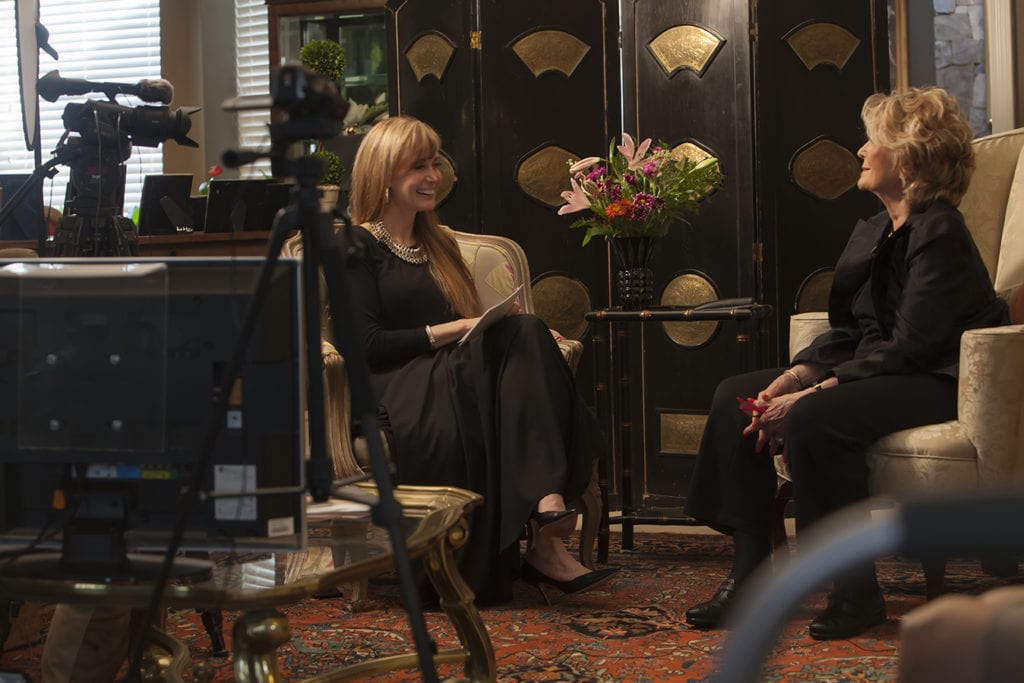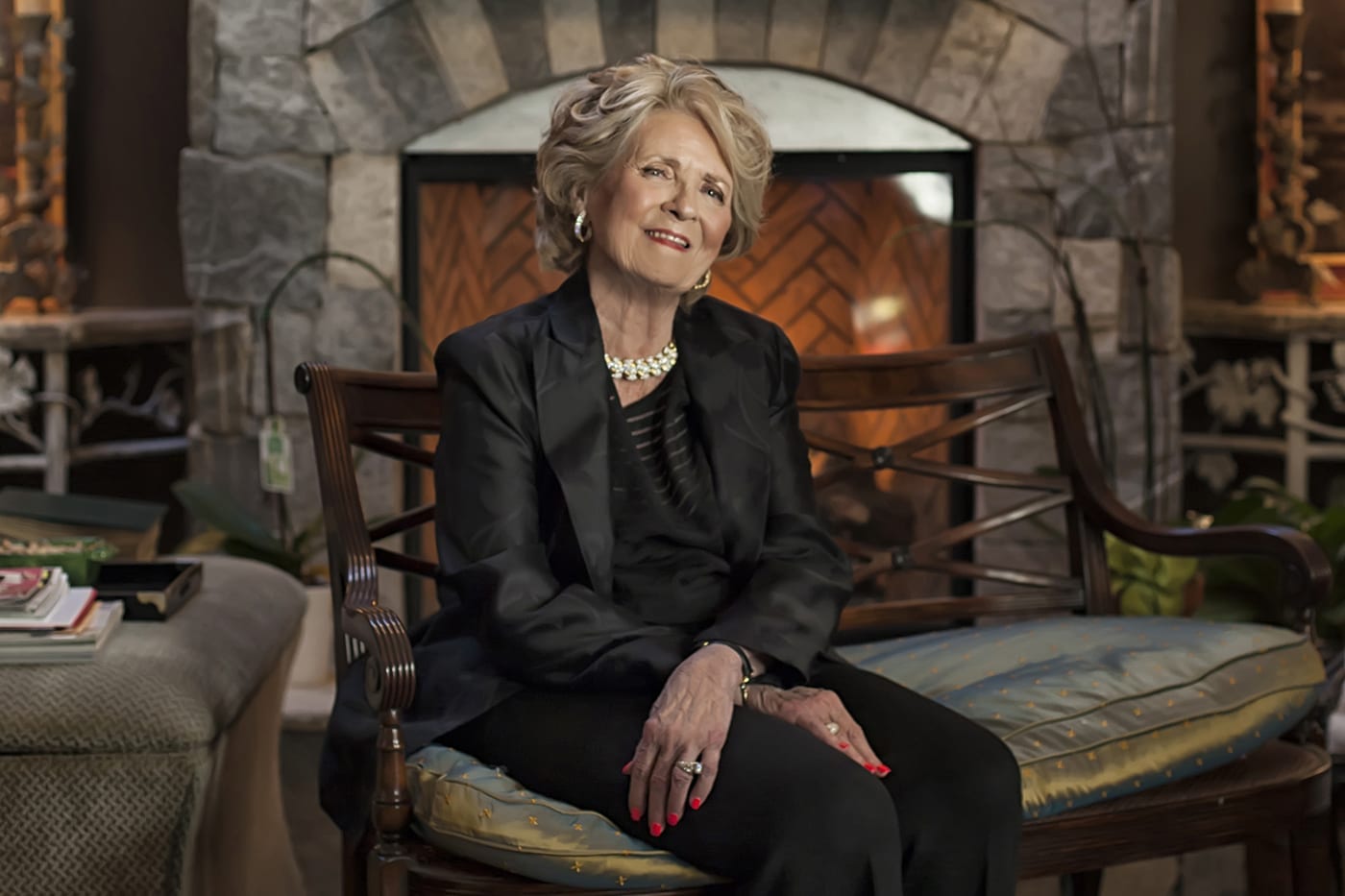Businesswoman & Journalism
Having grown up in the newspaper business, Phyllis DeLapp became a businesswoman at a very young age. When her role model, her father, passed away, she and her brother took over Mid-South Management Company, a large newspaper company. Today, Phyllis is very active with her philanthropic interests, most notably Spartanburg Methodist College in South Carolina.
Q: Who was the person that molded you the most?
A: It would be my dad. My mom died when I was 12 and left my dad with a 2-year-old and a 12-year-old, which is an awesome responsibility to have.
Q: Do you remember your mother?
A: Very much, yes. My mother was 39, and it didn’t occur to me then that 39 was extremely young. She had a Berry aneurysm, which is a blood clot in the brain.
Q: You were physically there with her when she had the aneurysm?
A: I guess I was. I had a group of girls spend the night that night. My father came in that morning and said, “The girls need to go home. Your mom’s going to have to go to the hospital.” In fact, I rode to the hospital in the ambulance with my mom. She was in the hospital for about two weeks before she passed away. The doctors said there was a drug, that if they gave it to her, could either be a big improvement or could be deadly. My dad was willing to take a chance that there might be a big improvement because the outlook was so grim.
Q: That’s very traumatic. Do you think it affected you?
A: Yes, I have always missed the things that girls do with their mom. I was always a little envious of my friends that had such close relationships with their moms. I think I missed out on a lot of fun.
Q: Do you think it affected your parenting?
A: Probably because I didn’t have anything to base it on, so I just hoped for the best.
Q: Where did you go to boarding school?
A: I went to Brenau Academy in Gainesville, Georgia. I was 14. My mother and daddy had already decided they wanted me to go to boarding school prior to her death.
Q: Did your father remarry after your mother’s death?
A: Yes, at least two times, but it was okay.
Q: When you came back from boarding school, was he remarried at that time?
A: He got married, and she was all right. She was good to my little brother. She was really his mother because he has no memory of our mother whatsoever. He was just 2 years old; he needed a mama. She did a great job raising him, and that was what was important.
Q: Your father, you, your son, and your nephew are very involved with Spartanburg Methodist College. How did that come about?
A: Well, the school is dear to my heart. My dad was on the board for many years. In fact, he was on the board when they changed the name of the school from Spartanburg Junior College to Spartanburg Methodist College. The college’s president, Steve Cochran, just came to work with us. He came from Wofford College, as a matter of fact. He is really bright. Spartanburg Methodist College is finally on financially, solid footing; I am so pleased that we have never turned a student down because they did not have the money to attend. I think that’s a powerful legacy for us.
Q: When did you find an interest in the newspaper business?
A: That’s all I ever knew.
Q: In your childhood, were you a girly girl or a tomboy?
A: I always played “store.” I did not play with my dolls. I played “store.”
Q: And do you remember, as a young girl, going with your father to the paper in Macon, Georgia?
A: I just remember that is where he worked. I didn’t know what he did. The office was closed on weekends, but we would go down to check his mail. He probably did that all his life.
Q: Did he ever talk to you about the newspaper business?
A: All he did was talk about newspapers. Of course, World War II was going on during this time, and that had a big effect. In fact, he was not drafted because he had two children and was in a strategic position. So, he did not serve in World War II, but he worked for the Macon Telegraph & News. The company that my dad worked for bought three daily newspapers: the Spartanburg paper, the Gadsden, Alabama, paper, and the Tuscaloosa, Alabama, paper. My father was chosen to come to Spartanburg and run the Spartanburg paper, which is how we came to South Carolina.
Q: Was he a journalist, a businessman, or an advertising guy?
A: Totally a businessman and an advertising manager.
Q: Did he have a creative side?
A: Probably not. Just strength in finances.
Q: What college did he attend?
A: Georgia Tech. We did not miss the Georgia Tech football games.
Q: How long did he serve as the Spartanburg paper’s publisher?
A: Thirty-five years.
Q: Why did he begin purchasing other papers?
A: Well, his connection with the company that owned the Spartanburg paper was a lease situation. Actually, it was an annual lease, and he realized, at some point, that if they chose not to sign the lease, we were out in the cold. So, he started his own company consisting mostly of small dailies or large weeklies. That was his niche and what he stuck to. I think that is how he remained so successful. He didn’t try to branch out. He understood a small daily is a totally different ballgame from a large daily. We are talking about small places like Union, South Carolina, as opposed to Atlanta.
Q: At age 72, your father passed away, and you and your brother took over Mid-South Management Company.
A: Yes, we owned Mid-South Management Company with over 17 newspapers. At one point, we had approximately 500 employees.
Q: For two decades, you and your younger brother Bill owned Mid-South Management. What
lesson can you share about your success?
A: We had such marvelous employees that the company ran itself. When you are good to your employees, they are good to you. There were four generations of people working for us. They loved us, and we loved them back. I think that was what was so special about Mid-South. We really were just one big family.
Q: Did they work hard?
A: Oh, yes, and everybody had such pride in their company and in their work. They wanted it to succeed, and they wanted to do well.
Q: Where did you actually print the papers?
A: Locally, in the newspaper offices. Most of the offices had their own presses.
Q: Where were your newspapers located, and how did you manage them?
A: We were close to an airport, so we could fly into every place that we had a newspaper, since they were all fairly close. We had quite a few papers in North Carolina. We even owned the paper in Mount Airy, the home of Andy Griffith.
Q: How far north did your newspapers span?
A: Ohio.
Q: How far south? Were you in Florida?
A: I don’t think we ever had a newspaper in Florida. We had some in Georgia, but I don’t believe we ever had one in Florida.
Q: Did you ever go as far west as Texas?
A: No, I don’t think so. Our concentration was really North Carolina, South Carolina, Georgia, Virginia, and West Virginia.
Q: What prompted your decision to sell?
A: Originally, we had not made a decision to sell. Then, one day someone contacted us with an offer. We could see the handwriting on the wall with the newspaper sector we owned, so we decided it was a good thing to do. Since there was someone wanting to buy it, we decided it was a good time to make the move.

Q: You are a businesswoman, but at one point, you were also a journalist?
A: Well, my ex-husband was in the Marine Corps, and I needed to make some money while he was stationed in Japan. So, I got credentials to be the Spartanburg Herald-Journal foreign correspondent. I wrote feature stories, everything from how to do Japanese flower arranging to Japanese cooking.
Q: What was the first newspaper job you had?
A: Writing obituaries.
Q: You are in great standing because many women journalists began their careers by writing obituaries.
A: Does that tell you anything?
Q: You really worked your entire life?
A: Yes, I did.
Q: How old were you when you were married?
A: Too young. I was 20-something.
Q: And you were whisked away to where?
A: To Quantico, Virginia.
Q: And what was that experience like?
A: Since I’d never been away from home, it was really quite an experience.
Q: You made a life-long friend during that time, didn’t you?
A: Yes, her name was Kay, and we were friends for 50 years. I miss her every day. It is interesting to have a friend like that for 50 years. We shared so many memories, and we were so much alike.
Q: And when was the last time you saw her?
A: Right before she died.
Q: Who was Bob DeLapp?
A: Bob DeLapp was my husband; he was quite a character. He was my blind date and was lots of fun. Teri Cullman said that he was the best dancer in South Carolina.
Q: Were you a good dancer?
A: Not like that.
Q: How long were you married to Bob?
A: We had 30 years of marriage. We had a really good time.
Q: He made you laugh?
A: Oh, yes. He made everybody laugh.
Q: So, what was the secret to a good marriage?
A: I don’t know. We had a good time and liked to do the same things. Well, we liked to go to the beach, and he would play golf. We liked each other.
Q: You have also lost two children and a husband. How were you able to cope?
A: There were so many good memories. We had so many blessings.
Q: Is that how you address tragedy? You try to think of the good in it?
A: Probably so, because in the midst of sadness, there really are so many, so many good things. We just don’t spend enough time thinking about the good things.
Q: Do you discipline yourself to do that, or are you a natural optimist?
A: I think both. I am not too impressed with people that sit around and think about the negative things in life. There’s too much to be thankful for.
Q: You have had a lot of heartache, and yet you have “pushed through” it. What is your secret?
A: I think you need to spend a whole lot of time being thankful for what the Lord has given you.
Q: Do you depend heavily on your faith?
A: Yes, I really do. My dad’s favorite prayer was, “Lord, make us truly thankful for these and all of our many blessings.” I think part of what is wrong with all of us is that we don’t take enough time thanking God for the many blessings we have. We have so much to be thankful for, and we need to spend a little more time being thankful for what we have.

